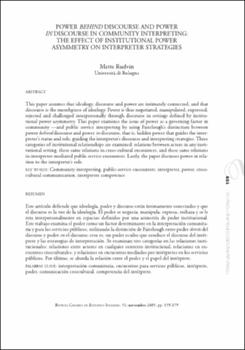Power behind Discourse and Power in Discourse in Community Inerpreting: The Effect of Institutional Power Asymmetry on Interpreter Strategies
Autor
Rudvin, MetteFecha
2005Resumen
This paper assumes that ideology, discourse and power are intimately connected, and that
discourse is the mouthpiece of ideology. Power is thus negotiated, manipulated, expressed,
rejected and challenged interpersonally through discourse in settings defined by institu-
tional power asymmetry. This paper examines the issue of power as a governing factor in
community —and public service interpreting by using Fairclough’s distinction between
power behind discourse and power in discourse, that is, hidden power that guides the inter-
preter’s status and role, guiding the interpreter’s discourse and interpreting strategies. Three
categories of institutional relationships are examined: relations between actors in any insti-
tutional setting, these same relations in cross-cultural encounters, and these same relations
in interpreter-mediated public service encounters. Lastly, the paper discusses power in rela-
tion to the interpreter’s role. Este artículo defiende que ideología, poder y discurso están íntimamente conectados y que
el discurso es la voz de la ideología. El poder se negocia, manipula, expresa, rechaza y se le
reta interpersonalmente en espacios definidos por una asimetría de poder institucional.
Este trabajo examina el poder como un factor determinante en la interpretación comunitaria y para los servicios públicos, utilizando la distinción de Fairclough entre poder detrás del discurso y poder en el discurso; esto es, un poder oculto que conduce el discurso del intérprete y las estrategias de interpretación. Se examinan tres categorías en las relaciones institucionales: relaciones entre actores en cualquier contexto institucional, relaciones en en-
cuentros crosculturales, y relaciones en encuentros mediados por intérpretes en los servicios
públicos. Por último, se aborda la relación entre el poder y el papel del intérprete.





